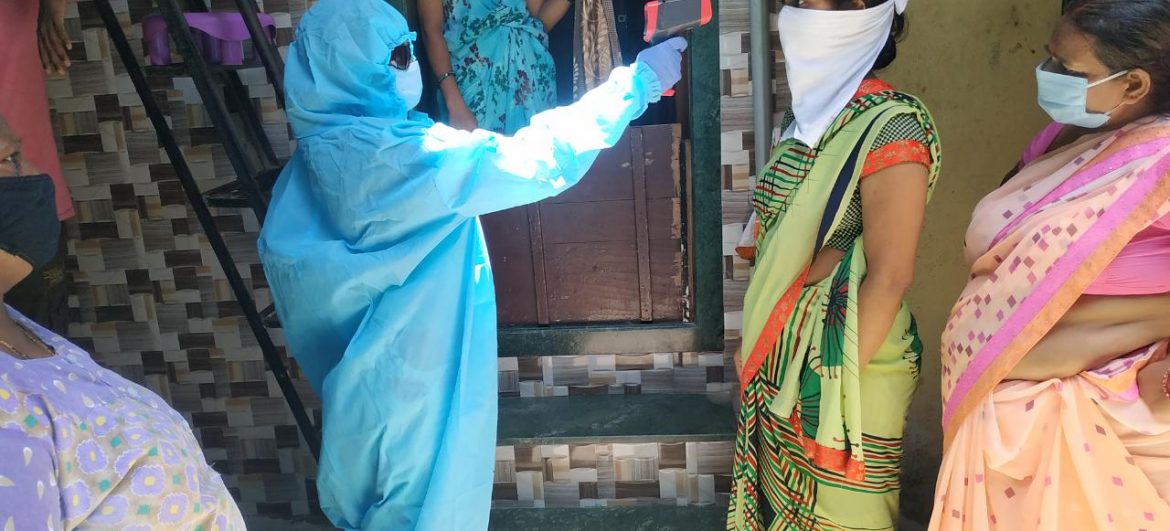Quis autem velum iure reprehe nderit. Lorem ipsum dolor sit nulla or narjusto laoreet onse ctetur adipisci.
Responding to COVID-19 outbreak – Mumbai

Responding to COVID-19 outbreak – Mumbai
The fear and uncertainty around the transmission of COVID-19 have affected relief efforts in vulnerable communities, but humanitarian organisation Doctors For You is ensuring that their needs are met
The lockdown has been eased in Mumbai. There are no police on the road. A lot of people are outside. After the first rains, the weather is pleasant too. Within two days vendors have started their Vada Pav stalls. For Dr Vaishali from Doctors For You, this is a matter of grave concern.
“Nearly 20 percent of the people are without masks. I think people are getting casual about it. Also, around 20 percent of the migrant population has gone back. The testing is less. Only very few get tested and, that too, if they show symptoms. Many isolation wards have vacant beds. We have started living with COVID-19 now,” she feels.
Doctors For You (DFY) is a pan India humanitarian organisation with expertise in working in disaster-hit zones. DFY focuses on providing medical care to the vulnerable communities during crisis and non-crisis situations, emergency medical aid to people affected by a natural disaster, conflict, and epidemics.
Before Mumbai went into lockdown on March 22, the DFY team was continuously following COVID-19 updates from other countries. Given the team’s experience of working in Mumbai’s M ward, an area where the Human Development Index is lowest in the country even on regular days, they were sure that if COVID-19 enters a densely populated city like Mumbai, things could go out of hand.
“Maternal Death, Child Mortality Rate, and Child Malnutrition are among the highest in the areas where we work. Whereas the Immunization Rate is among the lowest. We were continuously in touch with Municipal Corporate of Greater Mumbai (MCGM) officials and were keen to partner with the government on COVID-19 so that we can fill the gaps. We didn’t want to go out individually and start from scratch,” says Dr. Vaishali.
She says the DFY team interacted with the government every day to understand the needs and then intervene as required. “We used to give them a list of things that we are supporting other hospitals with and keep them updated about our work,” says Dr. Vaishali.
Transportation was a big challenge for the DFY team in the initial days. The team had only three vehicles which were used to ferry staff from home to office and back in addition to critical medical work during the day.
“The staff was scared. There was a lot of resistance from the families of the staff and the volunteers. Every day in the news, their families heard about deaths. One of our staff tested COVID-19 positive. After this incident, nearly 80 percent of the staff refused to work.”
Over the last three months, the DFY team has been engaged in several critical activities supporting the government’s COVID-19 relief efforts and spreading awareness in affected communities. The team set up an isolation ward with 100 beds in M East ward and H ward, enabled screening and contact tracing, trained health workers, and helped transport COVID-19 patients to government hospitals. To ensure that people in the communities are aware of the nature of the pandemic and ways to protect themselves, the DFY team organised an ambulance where medical workers gave tips on COVID-19 preventive measures using audio-visual tools at over 80 locations in Mumbai.
“Those part of essential services, like the traffic policemen, faced the risk of contracting the infection, so we distributed soaps, masks, and towels at all police stations,” says Dr. Vaishali.
One of the key concerns for DFY was the state of Primary Health Care (PHC) in communities and the need to provide medication to non-COVID-19 patients. Unfortunately, there were restrictions on starting PHC as the state government was afraid that opening clinics was risky and would spread the infection further.
Dr Vaishali says, “We started PHC only after April 15. The community people didn’t know what to do for a stomachache or low sugar and used to ask me when I was going to open the clinic. Eventually, we requested the government and got permission to open the PHC after assuring them that we would follow all protocols.”
On regular days, DFY keeps its OPD open for six hours, but during the lockdown, they had to restrict it to two hours. The team has now started organising online or teleconsultations between regular patients and doctors at DFY centres, but feels that there is a need for a system where everyone can consult a doctor without coming to the center.
The threat posed by COVID-19 is still not over in India and Mumbai remains one of the severely affected regions. According to DFY, it will require a lot of effort and more coordination to ensure that there are no deaths caused indirectly due to COVID-19 lockdowns. One of the suggestions by the DFY team is to create a database of TB patients and to start treating them immediately. Many TB patients have been unable to access medication during the lockdown. In addition to this, immunisation and malnutrition also require immediate attention.
You can reach out to DFY at info@doctorsforyou.org

You must be logged in to post a comment.
This site uses User Verification plugin to reduce spam. See how your comment data is processed.